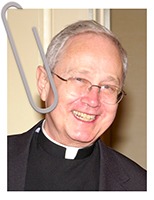 “These are the things I learned (in Kindergarten):
“These are the things I learned (in Kindergarten):
1. Share everything.
2. Play fair.
3. Don’t hit people.
4. Put things back where you found them.
Etc.
Sound familiar? Remember All I Really Need to Know I Learned in Kindergarten by Robert Fulghum.
Evoking one of my favorite insights of the great theologian Karl Rahner, “forgotten truths”, Fr. Robert Maloney reminds the Vincentian Family of forgotten truths about our role in creation. Here are some thoughts from his sixth chapter of A New Century Dawns: Hopes for the Vincentian Family
The key forgotten truth, “the universal destination of material goods”, is extremely relevant today, especially in societies like the United States and Western Europe where we defend the right to private property unquestioningly in almost all circumstances.
In Bolivia on Thursday, July 9, 2015, a few months after the publication of Laudato Si’, Pope Francis returned to the theme: The universal destination of goods is not a figure of speech found in the Church’s social teaching. It is a reality prior to private property. Property, especially when it affects natural resources, must always serve the needs of peoples.”
Fr, Maloney writes,
While welcomed by many, this assertion has also aroused strong negative reactions. Calmer voices have pointed out that the universal destination of material goods has been part of Catholic Church teaching for centuries, though, in candor, one must admit that it has often been a “forgotten truth”.
Let me recall an example from the mid-20”’ century. On March 26, 1967, Populorum Progressio appeared,” an encyclical calling for “concrete action toward each persons complete development and the development of all humankind”. In a quick, strong reaction, the Wall Street Journal labeled the encyclical “warmed- over Marxism,” as if it were a radical departure from previous Catholic thinking.
Paragraph 22 was the focal point of the criticism: The recent Council reminded us of this: “God intended the earth and all that it contains for the use of every human being and people…” All other rights whatsoever, including those of property and of free commerce, are to be subordinated to this principle.
Returning to his roots as an excellent seminary teacher he offers a concise tour of the highlights of that tradition from the scriptures through 2000 years of theological reflection down to the forceful teaching of the Pope’s since the 19th century. There is so much we have forgotten but with his usual clarity of expression, he walks us through our kindergarten years.
Then, as the skilled mentor, he proposed ten considerations, some of which contain crucial questions.
He concludes…
“Theology does not pretend to offer detailed, concrete solutions for complex socio-economic questions like these. I would welcome further thoughts, not just from the theological community but also from specialists in economics, sociology, law and other disciplines.
If we are convinced of the universal destination of material goods, a largely forgotten truth, such a transformation will be possible. How can our worldwide Vincentian Family contribute to that transformation?”
Think about the first four things Robert Fulgham lists and think about simple yet radical they are.
I hope you are stimulated to buy, read and encourage others to read and discuss A New Century Dawns: Hopes for the Vincentian Family
Fr. Robert Maloney -Catalog #2017 $10.00


“Populorum Progressio” bears no Marxist message. It’s foolish that a writer in “The Wall Street Journal” attempted to equate the idea of “universal destination of material goods” with the atheistic stance of Marxism. Indeed, the common sense of the Rev. Robert Fulghum and Father Robert Maloney evidences the ideals of sharing with our brothers and sisters the goods which God has loaned to us as stewards of His creation.